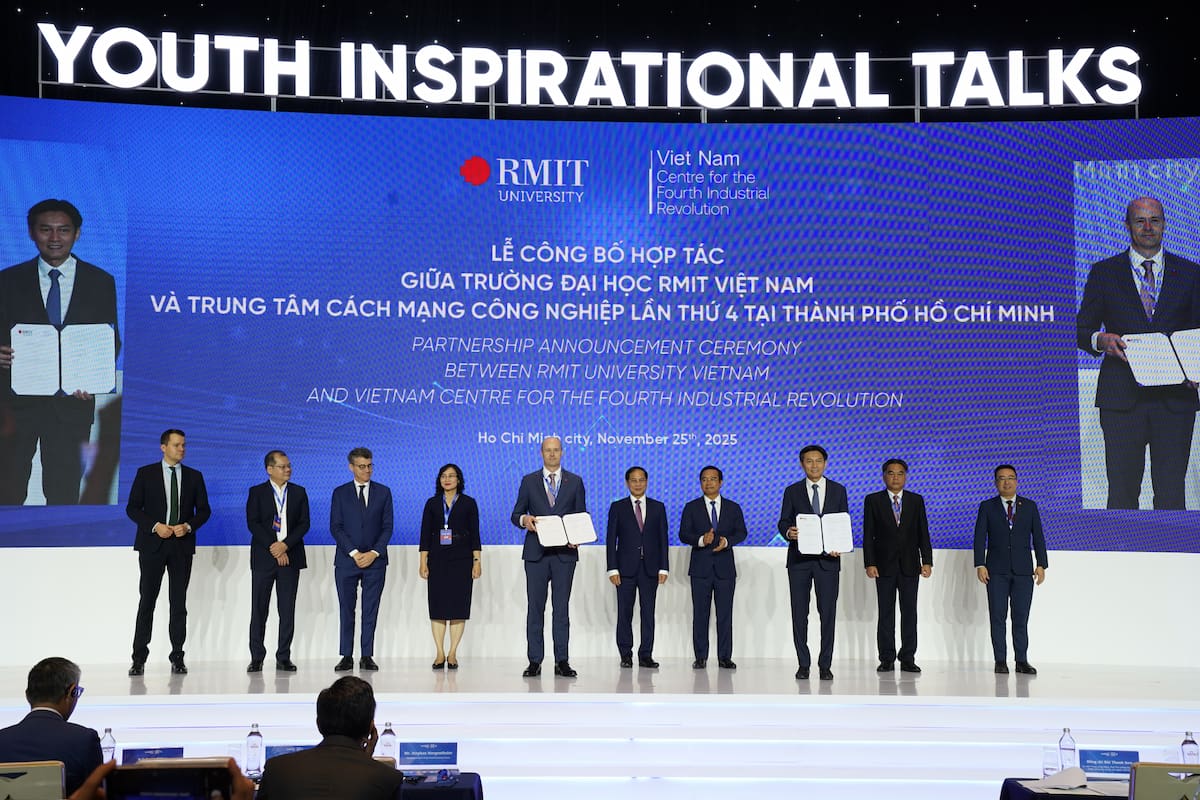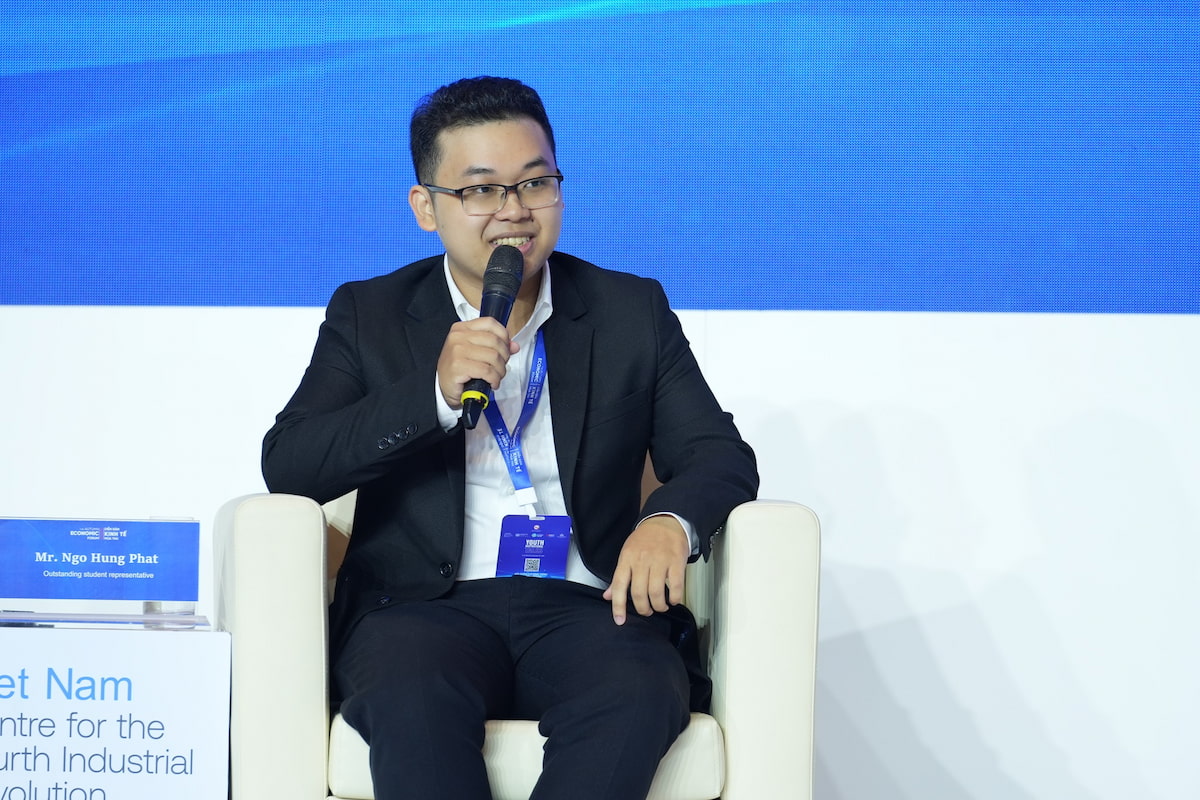
On 25 November 2025, RMIT University Vietnam and the Viet Nam Centre for the Fourth Industrial Revolution in Ho Chi Minh City (HCMC C4IR) officially announced their strategic collaboration during the Youth Inspirational Talks of the Autumn Economic Forum 2025, marking a significant step in strengthening collaboration between the University and the city government to promote research, education, and innovation for sustainable development.
HCMC C4IR operates under the People’s Committee of Ho Chi Minh City and was established in strategic collaboration with the World Economic Forum (WEF). As part of the WEF’s global network of Centres for the Fourth Industrial Revolution, the Centre serves as a think-and-do tank that drives innovation, policy development, and technology adoption to advance the city’s intelligent and inclusive economy.
 RMIT Vietnam’s Pro Vice-Chancellor and General Director Professor Scott Thompson-Whiteside and HCMC C4IR Deputy Director Mr Pham Phu Truong announce the strategic collaboration between the two parties at the Autumn Economic Forum 2025. (Photo: Organisers)
RMIT Vietnam’s Pro Vice-Chancellor and General Director Professor Scott Thompson-Whiteside and HCMC C4IR Deputy Director Mr Pham Phu Truong announce the strategic collaboration between the two parties at the Autumn Economic Forum 2025. (Photo: Organisers)
The announcement of the strategic collaboration was witnessed by Deputy Prime Minister Bui Thanh Son; Deputy Secretary of the Ho Chi Minh City Party Committee, Chairman of the Ho Chi Minh City People’s Committee Nguyen Van Duoc; and leaders of ministries and government agencies, representatives of the World Economic Forum (WEF), international organisations, businesses, academia, and innovation centres.
As Ho Chi Minh City accelerates its transformation into a regional hub for innovation and economic growth, the collaboration highlights the shared goal of connecting academic expertise with policy and technology to address real-world challenges. The partnership provides a long-term framework for collaboration to strengthen Vietnam’s innovation ecosystem and build a future-ready workforce.
The strategic collaboration between the two parties is formalised through an MOU, which outlines a long-term partnership leveraging their strengths in policy research, education and innovation to:
Advance Vietnam’s smart urban transformation and innovation ecosystem through joint initiatives in research, talent development and technology application;
Foster a knowledge-based, innovation-driven economy by connecting academia, government and industry in the context of the Fourth Industrial Revolution; and
Promote international cooperation and global recognition of Ho Chi Minh City as a regional hub for intelligent and sustainable economic development.
Professor Thompson-Whiteside, Pro Vice-Chancellor and General Director of RMIT University Vietnam, said the agreement reflects RMIT’s deep commitment to supporting Ho Chi Minh City in achieving its innovation goals.
“We share the city’s ambition to shape a smarter, more sustainable future. This collaboration allows us to apply our expertise to create meaningful impact for the community,” he said.
Echoing this vision, Mr Le Truong Duy, Director and Vice Chairman of the Board of Management of HCMC C4IR, said the partnership will accelerate innovation and policy alignment with the city’s development priorities.
“As a key initiative under the People’s Committee, HCMC C4IR values this partnership with RMIT in advancing technology innovation and policy development that align with Ho Chi Minh City’s strategic direction,” he said.
Building on this shared commitment, the MOU sets out a broad framework for cooperation across six key areas:
Smart urban transformation and innovation, through joint research, knowledge exchange and capacity-building programs;
Research and education, including PhD scholarships, student training, applied research and innovation ecosystem support;
International conferences, co-hosted annually on topics such as smart urban development, energy and emerging technologies;
Innovation and Smart Manufacturing Hub, collaborating at RMIT’s Saigon South campus and the city’s R&D compound on policy-oriented pilot projects and applied research for smart-city technologies;
The Autumn Economic Forum 2025 and beyond, including a youth and startup-focused talkshow co-organised by RMIT and C4IR; and
Global networking, strengthening ties with the World Economic Forum (WEF) and international partners through joint participation in events and exhibitions.
This year’s Autumn Economic Forum 2025, held under the direction of the Prime Minister and hosted by HCMC C4IR in collaboration with the World Economic Forum (WEF) and relevant municipal departments, marks a major milestone in the city’s economic strategy, bringing together government, academia and industry leaders to discuss pathways for innovation-led, sustainable growth.
 Ngo Hung Phat, a student representative from The Business School of RMIT Vietnam, joins the youth discussion panel at the Youth Inspirational Talks. (Photo: Organisers)
Ngo Hung Phat, a student representative from The Business School of RMIT Vietnam, joins the youth discussion panel at the Youth Inspirational Talks. (Photo: Organisers)
At the opening session on 25 November, Professor Scott Thompson-Whiteside delivered the opening remarks, emphasising the importance of youth leadership and global collaboration in advancing Vietnam’s twin green and digital transition.
RMIT’s presence at the Forum was further highlighted through the participation of Ngo Hung Phat, a student of The Business School, who represented the University among the youth delegates. As part of the Youth Inspirational Talks, he joined five other outstanding young delegates in an interactive discussion to explore how Vietnamese youth can contribute to the country’s twin green and digital transition in an increasingly interconnected global era.
Throughout the discussion, the delegates examined the importance of equipping young people with future-ready skills, strengthening their participation in innovation ecosystems, promoting digital responsibility, and advancing technology-enabled solutions that support climate resilience and sustainable development.
Looking ahead, both parties will further develop joint initiatives connecting research, education, and innovation to address Ho Chi Minh City’s future challenges.
The collaboration reinforces RMIT Vietnam’s commitment to working with government and industry to foster innovation, technology and human capital development for lasting social and economic impact.
Story: Quan Dinh H.
Hidden costs in the supply chain could price some Vietnamese exporters out of Europe.
RMIT Vietnam continues long-term commitment to talent development with its record 2026 Scholarship program worth more than 200 billion VND.
Vietnam’s new Atomic Energy Law opens the door to advanced nuclear technologies, but success will hinge on grid readiness, safety culture, and skilled people, say RMIT University Vietnam academics.
As Vietnam’s Law on Atomic Energy takes effect on 1 January 2026, nuclear power is back in the spotlight as a strategic pillar for energy security and carbon neutrality.